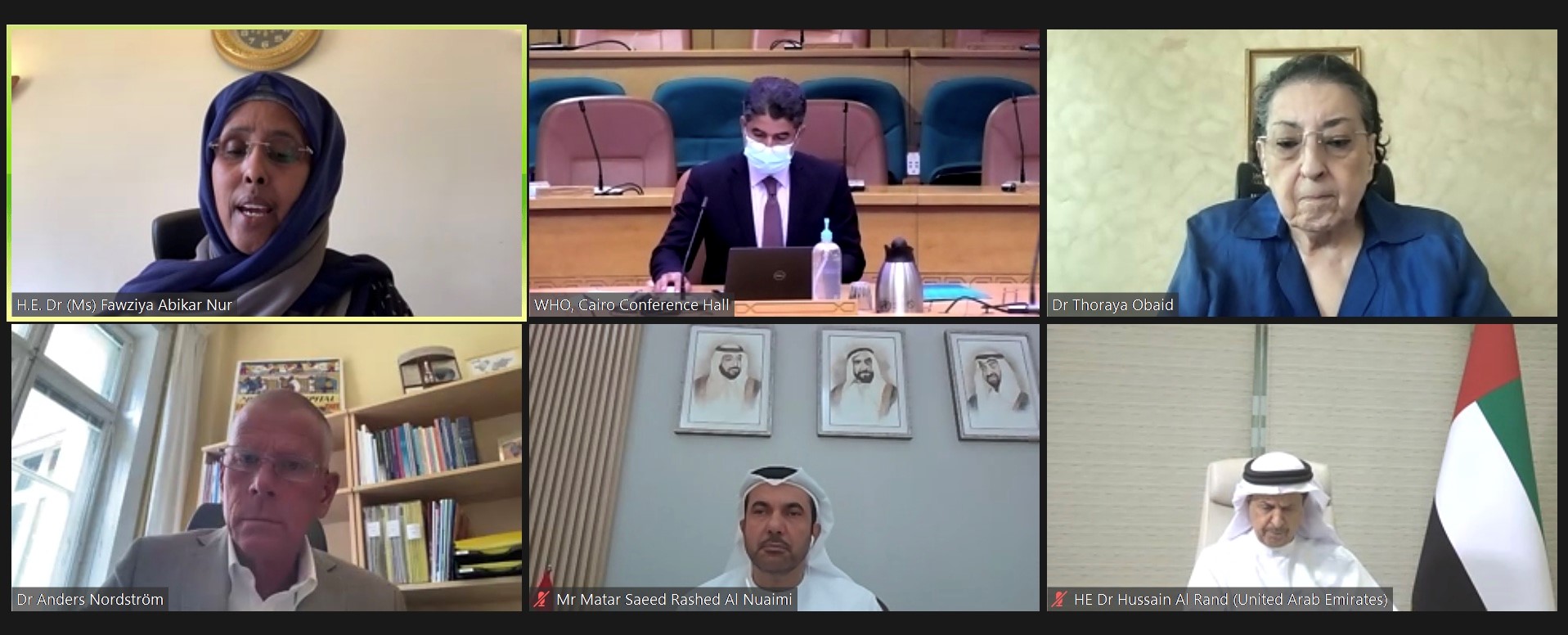 Cairo, 28 September 2021 – WHO convened a meeting attended by diverse regional and global public health leaders to discuss pandemic preparedness and response from the perspective of countries in the Eastern Mediterranean Region, particularly those affected by conflict. The meeting took place on 6 September 2021 and was organized in collaboration with the Lancet-SIGHT Commission on Peaceful Societies, the Independent Panel on Pandemic Preparedness and Response (IPPPR), and the Abu Dhabi Public Health Centre in the United Arab Emirates.
Cairo, 28 September 2021 – WHO convened a meeting attended by diverse regional and global public health leaders to discuss pandemic preparedness and response from the perspective of countries in the Eastern Mediterranean Region, particularly those affected by conflict. The meeting took place on 6 September 2021 and was organized in collaboration with the Lancet-SIGHT Commission on Peaceful Societies, the Independent Panel on Pandemic Preparedness and Response (IPPPR), and the Abu Dhabi Public Health Centre in the United Arab Emirates.
Fifteen health leaders representing Pakistan, Somalia, Sweden, Tunisia and United Arab Emirates, along with IPPPR and academia from Georgetown and Duke universities were invited, along with WHO staff from country, regional and global levels. They discussed the challenges, realities and opportunities facing the Region that contribute to the ongoing preparatory work taking place in line with the work of the Independent Panel and inspired by the global health community’s ambition for a pandemic treaty.
Global efforts to strengthen preparedness and response capacities for health emergencies is expected to be debated by a special session of the World Health Assembly (WHA) in November 2021. An open-ended working group comprising Member States of various WHO regions has been established by the Health Assembly and tasked with leading preparatory work on an International Framework Convention.
Voice of the Region
Countries of the Region are part of this ongoing global debate and are contributing to the global effort to create a stronger international system. The Region can play an important role in advocating for global, regional and national efforts to build, strengthen and maintain strong health security and pandemic preparedness and readiness capacities to prevent future catastrophic health events similar to the COVID-19 pandemic.
During the event, which was attended by around 2000 people, the rationale, structure, process and progress of work undertaken since May 2021 by the Independent Panel in preparation for the WHA in November was presented. This included a detailed discussion around the 7 key findings of the Panel’s report and the 8 recommendations to strengthen the pandemic preparedness and response system, including the establishment of a new global surveillance system and elevating leadership for global health.
Participants discussed recommendations, conclusions and priorities. Health leaders and academics debated the report and mapped different views and voices from various countries of the Region, particularly conflict-affected countries. These countries present complex contexts, along with political and resource-compromised settings that should be considered through a consultative process in preparation for the special meeting of the WHA in November. The discussion was supported by findings from studies in the Region, as well as lessons learned from developed countries.
At the end of the event, participating public health leaders affirmed that the ongoing global debate on pandemic preparedness cannot ignore the unique perspective of countries of the Region and confirmed the importance of working together to find solutions to optimize available opportunities and support building systems and societies for effective preparedness against future pandemics.
Related link
Watch a recording of the meeting


